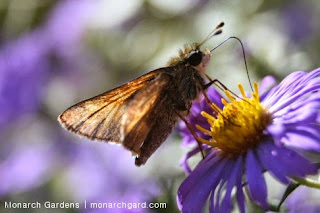The same self interest that dominates our consumer-driven capitalist
culture -- and that destroys biodiversity, ecosystem health, and
planetary resiliency -- is evoked in how we garden. If we garden for
ourselves, choosing only those plants whose blooms or leaves are pretty
to us but not to pollinators and other wildlife, we are directly harming
the planet through wasted space and denied life processes. Even if we
see one bee on a hosta bloom or a bird perched in a Japanese maple,
it does not mean these plants are beneficial to wildlife or the
ecosystem -- the web of life is much more intricate than a momentary
observation; it's so intricate we may never know, and that's ok.
A new gardening ethic that is required does not limit your options,
attack you, or condemn -- but it is easy to feel that these things are
happening because the larger implications are that even our smallest
actions matter in some negative ways; but such a revelation can be
empowering if we embrace the challenge, and the joy, of living with
nature and not against it (and learning from it). While gardens are totally artifice and may
never be fully integrated into the larger / wilder world, in an age of
novel ecosystems where nothing is left untouched by us, gardens become
lifelines -- both for other species and ourselves, physically and
emotionally. Garden with regional native plants. Celebrate your unique
home. Get in balance with a life our cultural systems say are invalid,
dangerous, and of another time and place when we were "lesser" as a
species.

6 comments:
Today in the newly planted garden a bee was hovering around me looking for flowers. I have buds. Does that count? Working on it.
It's very disheartening that most people treat their garden as if it's another room in their house - mowed lawn as carpet, anything "messy" carted away (dried plants in the fall, anything that's not lawn either paved or red mulch, no tolerance for dead tree branches or snags). But there seems to be a rising tide of gardening as if it mattered to anything but the gardener's whim.
The other day I was standing near my neighbor's fully blooming lilacs watching for pollinators. No luck. I then stepped over to my Aronias and was greeted by at least a dozen species of native bees, wasps, flies, and beetles swarming over the flowers. To favor a plant just because it looked pretty would make me feel selfish and petty. I prefer to see them as contributing players in the ecosystem.
Here in our NE Ohio urban back yard, we have been working to create an understory beneath the pin oaks in our yard and the neighboring yards. We try to imagine what it looks like to a migrating warbler or a potentially nesting Catbird. Our planting include numerous native shrubs that can be found in the woods and edge habitats here, and these provide shelter and nesting places.We see more native insect in our flowering plants every year. Does it look a little chaotic back here? Yes, and fabulously so!
It's been amazing to see how wildlife populations ebb and flow in my garden -- I'm experimenting with leaving a bit more winter detritus up for summer to see how it's used, too. I remember clearly the summer when my native plants began to outshine the exotics -- the pollinator counts and diversity were incredible, mind blowing. But the great thing is a native plant garden doesn't have to look totally "wild" or uncontrolled -- good design can make it more appealing to us while being more appealing to wildlife.
One thing that helps to keep a native garden looking more traditionally ornamental is "clumpifying" in the spring - that is, thinning the shoots of each plant back to a single, vigorous clump. Particularly the rhizomatous species like perennial sunflowers, heath aster, mountain mint, wild bergamot. Obviously not for large-scale plantings but easily manageable in suburban yards.
More and more I've been gardening for the wildlife. It's their garden too.
Post a Comment